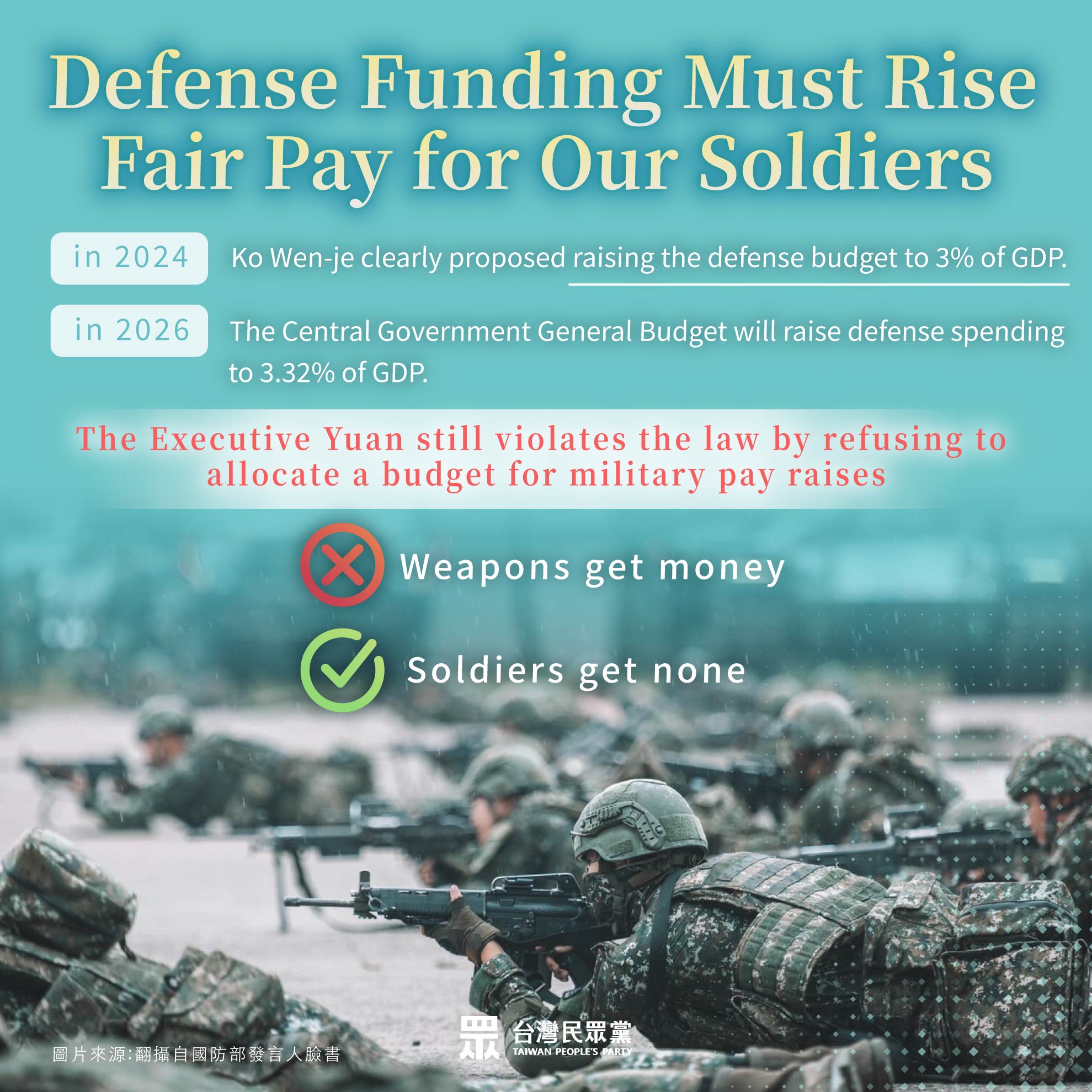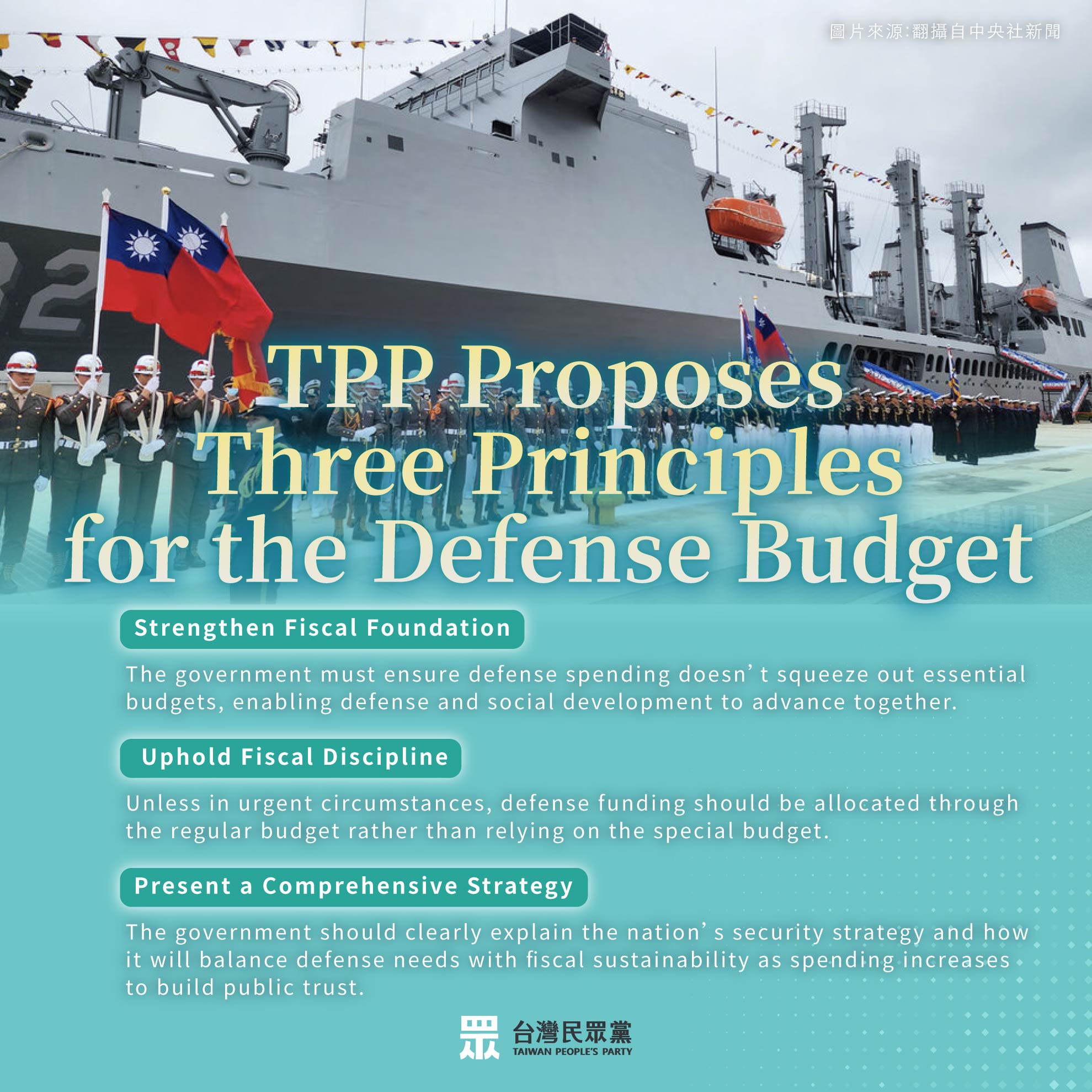Armed Forces Day – Salute to the Heroes Who Defend Our Homeland
Taiwan People’s Party Press Release
Armed Forces Day – Salute to the Heroes Who Defend Our Homeland

On Armed Forces Day, the Taiwan People’s Party (TPP) extends our highest respect to all the men and women of our armed forces. We are deeply grateful for your fearless and selfless dedication — standing guard over our nation’s security 365 days a year and rushing to the frontlines whenever natural disaster strikes. But beyond gratitude, true support must be reflected in policy and budgeting, ensuring that every soldier receives the fair treatment and resources they deserve.
Defense Funding Must Rise, Fair Pay for Our Soldiers
In the 2024 presidential election, former Chairman Ko Wen-je clearly proposed raising the defense budget to 3% of GDP. Now, the Executive Yuan has announced that beginning in 2026, the central government budget will increase defense spending to 3.32% of GDP, surpassing NT$949.5 billion. Facing China’s growing military threats, the TPP believes that strengthening Taiwan’s defense capabilities is a necessary decision to enhance deterrence.
However, money must be spent wisely. Taiwan is already struggling with a severe shortage of military personnel, yet the Executive Yuan continues to violate the law by refusing to allocate a budget for military pay raises. This raises serious doubts about whether the ruling party truly cares about the needs of rank and file soldiers.

Lai Government’s “5% Defense Budget” Goal Cannot Sacrifice Fiscal Stability and the Next Generation
Taiwan’s fiscal structure is fundamentally different from that of frontline European countries. In Europe, the tax burden rate is typically 30–40%, giving governments a larger fiscal base to sustain both defense spending and social investment. By contrast, Taiwan’s tax burden rate is only 14.7%, far below the OECD average of 34%. With such a limited fiscal base, defense spending at the same GDP ratio creates much greater fiscal pressure.
Today, Taiwan’s defense budget has already been raised to 3.32% of GDP — comparable to Poland, the Baltic states, and Greece, countries directly exposed to military threats. This demonstrates Taiwan’s determination for “self-strengthened defense.” However, President Lai Ching-te has now declared a new goal: raising defense spending to 5% of GDP by 2030. Without concrete funding sources, such a massive increase will unavoidably affect social welfare and public infrastructure, or force the government into debt — passing the fiscal burden onto future generations.
Defense Budgets Should Strengthen Security, Not to Allow DPP-friendly Businesses and Elites to Profit.
Recent scandals have shaken public trust. Presidential adviser Chen Kuo-chin’s company, Singtex, was linked to Ministry of National Defense procurement projects worth tens of billions of NT dollars. In another case, insiders at the National Chung-Shan Institute of Science and Technology attempted to sell classified tender documents on a “Smart Surveillance System” project to private contractors for money. These actions not only foster corruption but also gravely endanger national security.
The TPP supports raising defense budgets to strengthen deterrence and security — not to create opportunities for DPP-friendly Businesses and Elites to profit. If defense resources are siphoned off by corruption, public trust in national security policy will collapse. The TPP demands a full investigation of all cases, severe punishment for those involved, and the establishment of transparent, effective oversight mechanisms. Only with clean governance can future increases in defense spending be justified.

TPP Proposes Three Principles for the Defense Budget
1️. Strengthen the Fiscal Foundation
The government must ensure that increased defense spending does not crowd out essential areas such as education, healthcare, industry, and infrastructure — enabling defense investment and social development to advance together.
2️. Uphold Fiscal Discipline
Unless in urgent circumstances, defense funding should be allocated through the regular budget rather than relying excessively on special budgets or flexible mechanisms. This ensures fiscal stability and prevents abuse.
3️. Present a Comprehensive Strategy
President Lai should clearly explain Taiwan’s future national security strategy. If defense spending is to reach 5% of GDP by 2030, how will the government balance defense needs, fiscal sustainability, and overall national strategy? Only by building public trust can such long-term commitments be sustained.
Armed Forces Day is not only about gratitude, but also about commitment. The Taiwan People’s Party will continue to fight for fair treatment for soldiers, support defense investment, and demand a sound national strategy. We will also hold the government accountable to fiscal discipline and ensure every defense dollar is spent where it truly counts.
Only when our soldiers serve without worry, and when defense is both strong and clean, can Taiwan truly safeguard the future for the next generation.
“Weapons get money, Soldiers get none.” — this must never be the reality of Taiwan’s defense policy.



